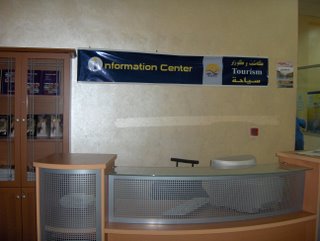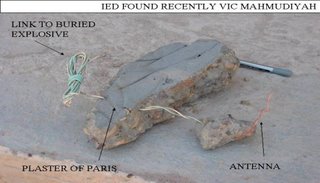The Airport is Half Full
My coworker and I have much different perspectives on Arbil International Airport and what it means for the future of Iraq.
I see the airport as a sign of Kurdistan's steady development. Flights arrive daily from Baghdad and Amman and there are less frequent flights from other international destinations, such as Stockholm, Athens, Frankfurt and Amsterdam. Kurdistan's new flagship carrier, Kurdistan Airways, started operations this year and is adding more destinations regularly. The region is becoming more integrated with Europe through Austrian Airlines, which is set to be the first Western carrier operating in Iraq, flying a Vienna to Arbil route. The airport's development is sure to strengthen Arbil's links to the rest of the world and increase investment in Iraq.
While the road to the airport is a dusty, barren, and awaiting construction, the airport itself is clean and well-maintained. The border guards are professional, and the custom officials don't bother you. They've invited me in for coffee when waiting for my flights. They're idle which suggests a bloated bureaucracy. I prefer to see it as an appreciation for unobstructed commerce and Middle Eastern hospitality.
The most promising sign is a booth that's been recently installed to greet visitors immediately after clearing customs. Though I've never seen it staffed, its directed to tourists and contains pamphlets in Arabic and English about all the great places to visit in Kurdistan. Perusing the guide, most of the destinations seem to be waterfalls, though there are plenty of other tourist draws. This is a drastic change from the tourism strategy for the rest of Iraq, which is centered on keeping visitors away. It wont be long before there's a Lonely Planet written for Kurdistan, and hopefully the new edition covering the whole of Iraq will follow.
A co-worker, who is twice my age and has been to a few more developing countries, ridicules the airport. Its classic third-world planning, he says, pointing to the conveyor belt for the luggage which is about the size of my office. To him this shows a complete lack of foresight. There are no departure signs and none of the exits are clearly labeled. There are pictures of Barzani throughout, as found in any dictatorship. He points to the Kalashnikov-wielding peshmergas at the entrance alongside plain clothed guards, and says this place is as insecure as anywhere else in Iraq.
The airport is also emblematic of Kurdistan's uncertain status. Since Turkey doesn't recognize the region, Kurdistan Airways can't fly through Turkish airspace. Some flights are recoded with an international partner, while other fly first to Baghdad and leave from there, skirting Turkey.
If my coworker is right and the airport does become obsolete in the long run, most of the air traffic will be going to Baghdad instead. This will mean that the security situation has improved, which will benefit Iraq and Arbil.
I see the airport as a sign of Kurdistan's steady development. Flights arrive daily from Baghdad and Amman and there are less frequent flights from other international destinations, such as Stockholm, Athens, Frankfurt and Amsterdam. Kurdistan's new flagship carrier, Kurdistan Airways, started operations this year and is adding more destinations regularly. The region is becoming more integrated with Europe through Austrian Airlines, which is set to be the first Western carrier operating in Iraq, flying a Vienna to Arbil route. The airport's development is sure to strengthen Arbil's links to the rest of the world and increase investment in Iraq.
While the road to the airport is a dusty, barren, and awaiting construction, the airport itself is clean and well-maintained. The border guards are professional, and the custom officials don't bother you. They've invited me in for coffee when waiting for my flights. They're idle which suggests a bloated bureaucracy. I prefer to see it as an appreciation for unobstructed commerce and Middle Eastern hospitality.
The most promising sign is a booth that's been recently installed to greet visitors immediately after clearing customs. Though I've never seen it staffed, its directed to tourists and contains pamphlets in Arabic and English about all the great places to visit in Kurdistan. Perusing the guide, most of the destinations seem to be waterfalls, though there are plenty of other tourist draws. This is a drastic change from the tourism strategy for the rest of Iraq, which is centered on keeping visitors away. It wont be long before there's a Lonely Planet written for Kurdistan, and hopefully the new edition covering the whole of Iraq will follow.
A co-worker, who is twice my age and has been to a few more developing countries, ridicules the airport. Its classic third-world planning, he says, pointing to the conveyor belt for the luggage which is about the size of my office. To him this shows a complete lack of foresight. There are no departure signs and none of the exits are clearly labeled. There are pictures of Barzani throughout, as found in any dictatorship. He points to the Kalashnikov-wielding peshmergas at the entrance alongside plain clothed guards, and says this place is as insecure as anywhere else in Iraq.
The airport is also emblematic of Kurdistan's uncertain status. Since Turkey doesn't recognize the region, Kurdistan Airways can't fly through Turkish airspace. Some flights are recoded with an international partner, while other fly first to Baghdad and leave from there, skirting Turkey.
If my coworker is right and the airport does become obsolete in the long run, most of the air traffic will be going to Baghdad instead. This will mean that the security situation has improved, which will benefit Iraq and Arbil.



